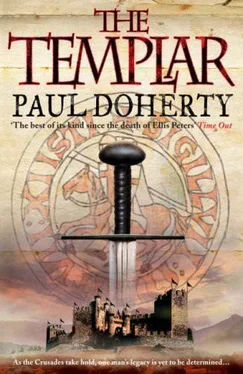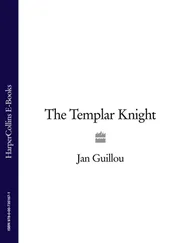P. Doherty - The Templar
Здесь есть возможность читать онлайн «P. Doherty - The Templar» весь текст электронной книги совершенно бесплатно (целиком полную версию без сокращений). В некоторых случаях можно слушать аудио, скачать через торрент в формате fb2 и присутствует краткое содержание. Год выпуска: 2010, ISBN: 2010, Издательство: Minotaur Books, Жанр: Исторические приключения, на английском языке. Описание произведения, (предисловие) а так же отзывы посетителей доступны на портале библиотеки ЛибКат.
- Название:The Templar
- Автор:
- Издательство:Minotaur Books
- Жанр:
- Год:2010
- ISBN:9780312576837
- Рейтинг книги:5 / 5. Голосов: 1
-
Избранное:Добавить в избранное
- Отзывы:
-
Ваша оценка:
- 100
- 1
- 2
- 3
- 4
- 5
The Templar: краткое содержание, описание и аннотация
Предлагаем к чтению аннотацию, описание, краткое содержание или предисловие (зависит от того, что написал сам автор книги «The Templar»). Если вы не нашли необходимую информацию о книге — напишите в комментариях, мы постараемся отыскать её.
The Templar — читать онлайн бесплатно полную книгу (весь текст) целиком
Ниже представлен текст книги, разбитый по страницам. Система сохранения места последней прочитанной страницы, позволяет с удобством читать онлайн бесплатно книгу «The Templar», без необходимости каждый раз заново искать на чём Вы остановились. Поставьте закладку, и сможете в любой момент перейти на страницу, на которой закончили чтение.
Интервал:
Закладка:
At daybreak on 15 July, the Year of Our Lord 1099, Godfrey of Bouillon and Raymond of Toulouse flung their armies at the walls of Jerusalem. A beautiful dawn, as Eleanor de Payens wrote in her chronicle, its serenity soon shattered by the creak of twisted ropes, the curses of men, the screech of wheels and the blood-chilling whine of fiery missiles, stones, arrows and blazing bundles. Crashing and thudding swept the air as the terrifying din of battle increased. Godfrey of Bouillon, his gold cross standard openly displayed, ordered his great tower forward. The defenders of Jerusalem brought up their slings and mangonels, loosing firebrands dipped in oil and grease at the attackers. A deadly race ensued; that was how Eleanor de Payens described it in her chronicle: the Franks desperate to bring up their tower, the Turks and Saracens eager to burn it before the besiegers ever reached the walls. A thick pall of smoke ringed the tower, penetrated only by missiles. At one time Godfrey of Bouillon himself was nearly killed. A stone hurled randomly struck a squire standing close to him; the man’s skull was shattered, his neck broken, and he died instantly. Godfrey, having narrowly missed such sudden death, fought back fiercely using his crossbow to bring down defenders.
The tower crept forward through the breach of the outer wall, closer and closer to the main defences. The top of the tower threatened to overlook the battlements of Jerusalem. Frankish archers and slingers released a deadly storm of stones and arrows. Fire was hurled back, but the tower was protected by mantlets and wattle screens covered with slippery skins. The firebrands and burning coals struck these only to slip down to the ground. The defenders brought up tubes of Greek fire, which belched out greedily, but the outside of the tower had been doused in vinegar whilst wineskins hung in the tower held more. The tower inched its way forward. On either side of it thronged archers who loosed shafts wrapped in flaming cotton; these struck the wooden defences, the sacks of straw and oiled ropes the Saracens and Turks had arranged along the wall to protect it against the rams, and they burst into flame, forcing the defenders from the parapets. Scaling ladders were hurriedly brought forward, whilst Tancred took a force of knights to pound at St Stephen’s Gate.
The defenders were now confused by the fires billowing along the battlements; curling smoke and acrid fumes blocked their view and confused their actions. The Portal of the Temple put up its scaling ladder, and one of their company, Lethold of Touraine, clambered up over the walls, the first knight to enter Jerusalem. The tower edged closer. Godfrey of Bouillon glimpsed two great beams thrust out by the Turks to hold it off. He swiftly cut the ropes of one of the ox-hide-covered mantlets, which fell across the beams to provide a makeshift drawbridge. Godfrey hurried across, his men pouring after him, their long swords hissing and cutting, fighting like demons through the black smoke. The breach was stormed and held. The tower crept closer. Further along the wall the three witches and the slaves supporting them were deluged by a hail of stones that pulped them into a bloody mess. The tower now leaned over the walls of Jerusalem. Its drawbridge fell. Scores of knights ran across on to the battlements to join Godfrey. The defenders panicked and ran. The collapse spread. The garrisons at the Herod Gate, St Stephen’s and further along at Mount Sion simply fled. Entrances were forced and the Franks poured like a river of revenge through the city, spilling out along every thoroughfare, street and alleyway. No quarter! No mercy was to be offered, nothing but the sword for men, women and children.
The Franks fanned out like reapers gathering some bloody harvest. Groups of Turks and Saracens made one final stand, archers still loosed arrows from rooftops, but it was all over. The governor and remnants of his Egyptian cavalry fled to the Tower of David and locked themselves in. The Franks simply passed through, living incarnations of the Angel of Death, a black cloud of murderous fury. Streets, squares, houses and gardens became thickly strewn with the corpses of men, women and children. Axes and swords fell until the fountains splashed red and the white walls became drenched in blood. Some hoped to gain sanctuary in the mosques; none was given. The Franks reached the courtyard of the Holy Sepulchre, where more people were huddled. They advanced, sword and axe at the ready, but their intended victims hurriedly knelt, crossing themselves, and croaked the prayer of mercy from the Mass: ‘ Kyrie Eleison, Christe Eleison ’ — Lord have mercy, Christ have mercy. The Franks sheathed their weapons, touched the heads of these Armenian Christians and went searching for other prey. They burst into the great Temple enclosure where Turks and Saracens clustered to surrender. None was accepted. By the time the slaughter was ended, men waded through blood that lapped beneath their knees and stained the harness of their horses.
At sunset the Franks put an end to their killing. They had, like wolves snuffling through the scrub, glutted themselves on gore and blood; now they doffed their armour, put on gowns and walked barefoot to the Church of the Holy Sepulchre to give thanks. They passed mounds of severed heads, arms and feet. They crossed a mat of corpses as they reverently chanted their psalms and hymns. They made their devotions and retired for the night.
Meanwhile the Portal of the Temple were hurrying down into the warren of gloomy passageways beneath the Dome of the Rock. Hugh de Payens and Godefroi of St Omer had survived and were zealous in their quest. The Fedawi had either fled or died in the massacre, so they hacked down doors and lifted rusting iron-plated traps until they found their treasures. They moved quickly and orderly all through that night and the next day, when the slaughter in the city began once again. No mercy was to be shown. This was God’s work, the Franks argued: their enemies had mocked, humiliated and used all manner of wickedness against them; this could only be purged by blood. Some survivors climbed on to the flat roof of the Aksa Mosque; Tancred offered them protection, even handing over his own standard, but the killers ignored this, storming on to the roof and massacring all three hundred survivors.
As smoke hung like a black cloud above a city stinking of slaughter, in the narrow passageways beneath the Dome of the Rock, Hugh and Godefroi ransacked the secret treasure hoards hidden away in chambers where the great Solomon had once stabled his horses. In the light of candles and lantern horns they rolled out the sacred cloth that once covered the Lord’s face. They knelt in adoration of it and repeated their solemn vows: kingdoms, princes and powers could trample through the streets of the Holy City. They would come and go, nothing more than a watch in the night, but the Portal of the Temple, the House of the Temple, the Templars would take root and grow as magnificent as the cedar of Lebanon…
Under the awning of her shabby tent on a hillside overlooking Jerusalem, Eleanor de Payens made herself comfortable on a faldstool, threading battered Ave beads through her filthy fingers. Theodore, blood-stained and smelling of fire and wood smoke, squatted before her. He had taken off his hauberk and leather leggings, and cradling a wineskin, he toasted Eleanor before taking a drink.
‘The City of Jerusalem has fallen.’ Theodore wiped his mouth on the back of his hand. ‘Your brother, using the maps he had gathered, has found his treasure trove. Relics, Eleanor, linen sheets containing imprints of our Saviour, documents, artefacts, precious stones, silver and gold. He and Godefroi-’
‘They are well?’
‘As strong as lions! They lost some of their company.’
Читать дальшеИнтервал:
Закладка:
Похожие книги на «The Templar»
Представляем Вашему вниманию похожие книги на «The Templar» списком для выбора. Мы отобрали схожую по названию и смыслу литературу в надежде предоставить читателям больше вариантов отыскать новые, интересные, ещё непрочитанные произведения.
Обсуждение, отзывы о книге «The Templar» и просто собственные мнения читателей. Оставьте ваши комментарии, напишите, что Вы думаете о произведении, его смысле или главных героях. Укажите что конкретно понравилось, а что нет, и почему Вы так считаете.












